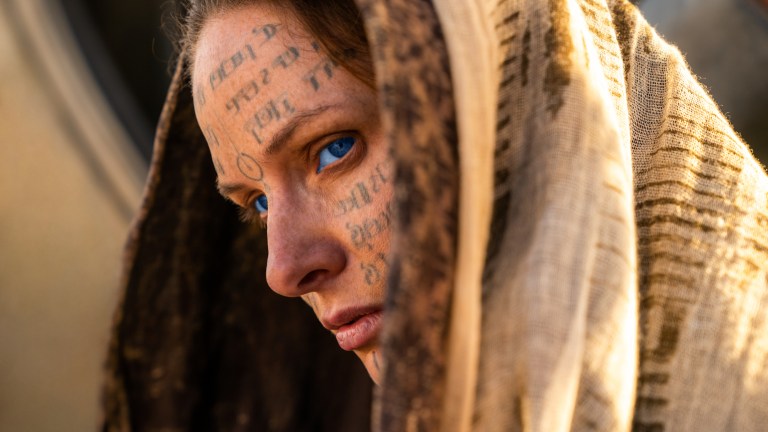Denis Villeneuve Explains Why Women Are ‘the Epicenter’ of His Dune Universe
Exclusive: Dune 2 director Denis Villeneuve explains why he chose to emphasize Bene Gesserit and the women of Dune even more than the novel.

This article contains mild spoilers from the Dune novel.
Director Denis Villeneuve faced many dilemmas when crafting the finale of his two-part Dune adaptation. Frank Herbert’s narrative is sprawling, and the climactic confrontation between Paul Atreides (Timothée Chalamet) and the forces of the Emperor (Christopher Walken) was full of landmines in terms of excessive exposition and outdated sensibilities. In fact, as last lines of a famous book go, we’re not sure if “we who carry the name of concubine—history will call us wives” would have flown for modern audiences buying tickets to this weekend’s Dune: Part Two. So it is not a spoiler to tell you Villeneuve did not include that bit of dialogue in his movie.
“No,” the director agrees when we bring up that problematic sign-off, which shifts some of the story’s strongest characters back into traditional female roles. “It’s a book that embraced a fatal world where the rules are medieval. In a book you have time to explain, but in a movie, where the audience is driven by emotions, you have to be careful with the ideas you’re bringing. At the end of the day, I wanted to bring the movie to a precise place, so I made some decisions.”
These decisions in turn got back to the root idea which Villeneuve always knew would differentiate his Dune adaptation from all other versions… including the novel.
“I always have been, since I was born as a filmmaker, concerned, inspired, and sensitive about the female condition and women’s relationship with power,” Villeneuve tells Den of Geek when we sit to chat with him ahead of Dune: Part Two‘s release. “Why? Because I had been raised in the ‘60s and ‘70s in a feminist environment, which is something that I love. So what is specific about the way I approached Dune? I would say it’s probably women. That’s the first thing I said to Eric Roth, who started to do the adaptation at the beginning. He asked me to summarize in a word what I wanted to do, and I said, ‘Women!’”
The director continues, “I want the movie to be an adaptation about the Bene Gesserit. I want the Bene Gesserit to be at the center of the epicenter of this adaptation. It’s one of the things I feel is the most accurate with our time.”
The main Bene Gesserit Sisterhood characters of Jessica (Rebecca Ferguson), Reverend Mother Mohiam (Charlotte Rampling), Lady Fenring (Léa Seydoux), and Princess Irulan (Florence Pugh) all have essential parts to play in the labyrinthine events which unfold in Dune: Part Two. Yet there’s another character, Chani (Zendaya), whose importance goes well beyond her part as Paul’s central Fremen ally and eventual lover/mother of his children in the books.
“In the book, Chani is a believer,” Villeneuve explains. “In this adaptation, Chani is part of a group of Fremen that don’t believe in this idea of a messianic figure. I did that for the audience to feel that the Fremen are in a society that is more complex, that everybody does not believe in the Bene Gesserit idea. This contrast gave me the possibility to have some perspective on Paul at the end.”
While we won’t tell you exactly how the film ends, Herbert’s final, exposition-heavy confrontations are told with maximum cinematic precision by Villeneuve and his Dune: Part Two co-screenwriter, Jon Spaihts. Complex verbal ideas are parsed down to the nub, and in some cases relayed with just a look or a gesture.
“It’s all about the character’s arc and the emotional impact of the film,” the director explains. “Discipline is required to be as economic as possible, specifically with dialogue. To always go the more direct way of doing things and trying to simplify. There’s an equilibrium when you’re trying to find a purity. The more simple you are, the more complex it becomes. It creates depth. When the surface is too dense, then you cannot go deeper. I tried to find that equilibrium onscreen. It took us months to write this part.”
Chani’s expanded character and the film’s streamlining of the climax were not the only major alterations afoot for Dune: Part Two. In the original book, Paul’s initiation into the Fremen, ascension to their leader, and battle against the Harkonnens happened over a few years. He and Chani even found time to have a baby. In the new movie, all these events happen over the span of less than a year.
“Momentum,” Villeneuve explains as the reason for compressing the timeframe of this film. “Pressure to feel that the character was running against time, and that the world was eroding under his feet quickly. To give him less time to have a grip on reality, and create more feelings of danger around him. He will not have the time to install himself in the culture; he will not have time to absolutely gain the trust of all the Fremen. I did that just to put Paul more on edge. That was the main idea.”
All these changes are in stark contrast to David Lynch’s film version of Dune (which this author penned a recent book about), with Princess Irulan’s narration in the ‘84 movie stating that “two standard years” pass during a single montage… even that “history will call us wives” line was filmed, though later discarded. Now that Denis Villeneuve’s dream of adapting Herbert’s book has been realized, he’s a little more open about what explicitly differentiates his version from Lynch’s more colorful, surreal take on the material.
“I think that the way I approach the desert is absolutely different,” he says. “There’s a level of realism I was looking for. I wanted the audience to believe in this world. I wanted to go away from fantasy as much as possible, even if it’s a fantasy world. To increase the drama so that people will believe in this tragedy and have a feeling of familiarity with it. I always had a lot of affection and respect for David Lynch’s adaptation. He’s a master. It’s just that we are, of course, very different directors. We have different sensibilities. I just felt that the dream I had in mind has not been made on screen yet, and that’s why I’ve done it.”
Dune: Part Two opens in theaters everywhere this Friday, March 1.
